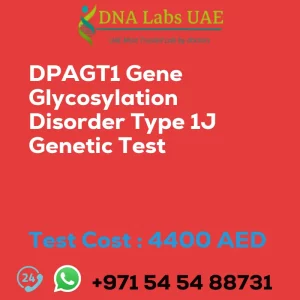G6PC Gene Glycogen storage disease type 1A Genetic Test
Welcome to DNA Labs UAE, where we offer the G6PC Gene Glycogen storage disease type 1A Genetic Test. This test helps diagnose and provide information about the specific genetic changes responsible for Glycogen storage disease type 1A (GSD1A).
Test Details
The G6PC gene is responsible for producing an enzyme called glucose-6-phosphatase, which is crucial for breaking down glycogen into glucose in the liver. Mutations in the G6PC gene can lead to GSD1A, an autosomal recessive disorder characterized by the accumulation of glycogen in various tissues, particularly the liver and kidneys.
Individuals with GSD1A may experience symptoms such as hypoglycemia (low blood sugar), growth retardation, enlarged liver and kidneys, and an increased risk of developing osteoporosis and kidney stones.
Test Components and Price
- Test Name: G6PC Gene Glycogen storage disease type 1A Genetic Test
- Components: NGS Technology
- Price: 4400.0 AED
- Sample Condition: Blood or Extracted DNA or One drop Blood on FTA Card
- Report Delivery: 3 to 4 Weeks
- Test Type: Metabolic Disorders
- Doctor: General Physician
- Test Department: Genetics
Pre Test Information
Prior to undergoing the G6PC Gene Glycogen storage disease type 1A Genetic Test, it is important to provide the clinical history of the patient. Additionally, a genetic counseling session may be conducted to draw a pedigree chart of family members affected with GSD1A.
Method
The G6PC Gene Glycogen storage disease type 1A Genetic Test utilizes Next-Generation Sequencing (NGS) technology. This advanced genetic testing method allows for the simultaneous analysis of multiple genes, including the G6PC gene, to identify any mutations or variations associated with GSD1A.
Test Process
The G6PC Gene Glycogen storage disease type 1A Genetic Test can be performed using a blood or saliva sample. The DNA is then sequenced to identify any variations or mutations in the G6PC gene.
Benefits of the Test
By confirming a diagnosis of GSD1A and providing information about the specific genetic changes responsible for the condition, the test results can help guide treatment and management strategies. Additionally, the results can provide information about the likelihood of passing on the condition to future generations.
At DNA Labs UAE, we are committed to providing accurate and reliable genetic testing services. Contact us today to schedule the G6PC Gene Glycogen storage disease type 1A Genetic Test and gain valuable insights into your health.
| Test Name | G6PC Gene Glycogen storage disease type 1A Genetic Test |
|---|---|
| Components | |
| Price | 4400.0 AED |
| Sample Condition | Blood or Extracted DNA or One drop Blood on FTA Card |
| Report Delivery | 3 to 4 Weeks |
| Method | NGS Technology |
| Test type | Metabolic Disorders |
| Doctor | General Physician |
| Test Department: | Genetics |
| Pre Test Information | Clinical History of Patient who is going for G6PC Gene Glycogen storage disease type 1A NGS Genetic DNA Test A Genetic Counselling session to draw a pedigree chart of family members affected with Glycogen storage disease type 1A |
| Test Details |
The G6PC gene is responsible for producing an enzyme called glucose-6-phosphatase, which plays a crucial role in the breakdown of glycogen into glucose in the liver. Mutations in the G6PC gene can lead to a condition called glycogen storage disease type 1A (GSD1A). GSD1A is an autosomal recessive disorder characterized by the accumulation of glycogen in various tissues, particularly the liver and kidneys. This buildup of glycogen impairs the body’s ability to regulate blood sugar levels, leading to symptoms such as hypoglycemia (low blood sugar), growth retardation, enlarged liver and kidneys, and an increased risk of developing osteoporosis and kidney stones. NGS (Next-Generation Sequencing) genetic testing is a type of genetic testing that allows for the simultaneous analysis of multiple genes, including the G6PC gene, in order to identify any mutations or variations that may be associated with GSD1A. This type of testing can help confirm a diagnosis of GSD1A and provide information about the specific genetic changes responsible for the condition. NGS genetic testing can be performed using a blood or saliva sample and involves sequencing the DNA to identify any variations or mutations in the G6PC gene. The results of the test can help guide treatment and management strategies for individuals with GSD1A, as well as provide information about the likelihood of passing on the condition to future generations. |








